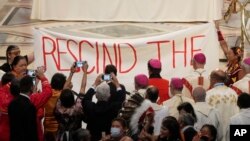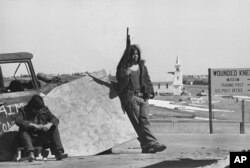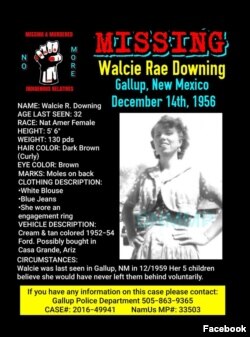Here is a summary of Native American-related news around the U.S. this week:
Pope Francis Apologizes to Indigenous Canadians for Residential School Abuses
Pope Francis was in Canada this week on what he called “a penitential pilgrimage” to apologize for the abuses First Nations, Métis and Inuit children endured in Catholic-run residential schools.
Speaking Tuesday in Maskawacis, Alberta, Francis said he was “deeply sorry…for the ways in which, regrettably, many Christians supported the colonizing mentality of the powers that oppressed the Indigenous Peoples,” and for “the ways in which many members of the Church and of religious communities cooperated, not least through their indifference, in projects of cultural destruction and forced assimilation promoted by the governments of that time, which culminated in the system of residential schools.”
He also pledged “a serious search” of the facts. Indigenous peoples have long asked for full access to Church records on abusive clergy members.
In a related development, Ermineskin Cree Chief Wilton Littlechild, facing strong criticism for gifting Pope Francis an eagle feather headdress in , defended his decision in an interview (below) with Cree/French/Iroquois journalist which she posted on her Facebook page.
In Quebec Thursday, Pope Francis acknowledged that Church members sexually abused “minors and vulnerable people.”
Friday, Francis was slated to meet with elder residential school survivors and schoolchildren in the Arctic town of Iqaluit.
Read the full text of Pope Francis' speech and apology
Champion of free Native American Press Dies at 88
Staff at the Native Sun News Today newspaper Thursday burned sage in a ceremonial tribute to the paper’s owner, Oglala Lakota citizen Tim Giago, who passed away Sunday from complications of heart disease, diabetes and, most recently, COVID-19, family members told VOA. He was 88.
Giago is remembered for founding the Lakota Times in 1981 as a weekly community newsletter for the Pine Ridge Indian Reservation in South Dakota. It later expanded coverage to state and national issues important to all tribes and was the first independently owned Native American newspaper.
In a 2017 interview with VOA, Giago described the state of Native American media at the time he began publishing.
“Primarily, the papers, almost 90% of them, were owned by the tribes, and if the tribal government became disillusioned with the editor of the paper-- because perhaps they wrote something that was critical of the tribe--they just shut them down.”
Giago tackled tough issues—and expressed strong opinions that earned him some criticism, gunfire, and the scorching of his newspaper office.
He was critical of the American Indian Movement (AIM), which in 1973 had occupied the settlement of Wounded Knee to protest controversial tribal chairman Richard Wilson. During the 71-day siege, several buildings, including the historic trading post where Giago’s father had once worked, burned to the ground.
“The battles between AIM and the tribal government were still raging when I started my weekly newspaper,” Giago wrote in 2022. “A strong believer in freedom of the press, I decided to use my editorial page to point out the damage the warring sides were doing to the everyday citizens of the reservation.”
His nephew James Giago Davies told VOA that when Giago announced plans in 2016 to buy Wounded Knee from its non-Native owner, many tribe members slammed him for being “profit driven and greedy.”
“They said that he only wanted to make money and that he was using a sacred site like Wounded Knee to promote himself. They didn’t understand that our family has a deep sentimental connection to Wounded Knee. It was their home.”
In 1983, Giago and fellow Native journalists organized the Native American Press Association, now the Native American Journalists Association. He served as its first president. Giago received an H.L. Mencken Award for editorial writing in 1985.
He rebranded his newspaper as “Indian Country Today” in 1992 and sold it to the Oneida Nation in 1998. In 2009, Giago founded Native Sun News Today in Rapid City, S.D.
“I think he will be remembered as someone who believed that a newspaper should be independent of any organization, tribe or political party,” said Davies. “Of all the goals he set for himself, that was the one he was most adamant about.”
‘Don’t be afraid to stand up,’ the legacy of Tim Giago
Minnesota Chippewa leaders to consider changing membership requirements
The Minnesota Chippewa Tribe (MCT), which represents six Chippewa bands, this week voted to remove a long-standing requirement that members have a minimum of 25 percent blood quantum, or Chippewa blood. That is the system the federal government and many tribes use to measure Native ancestry.
Blood quantum is based on a simple formula: Half of the combined degree of “Indian blood” an individual’s parents’ possess. So, if both parents have 100% Indian blood, their child will have a BQ of 100%.
Increased urbanization and intermarriage with non-Natives has diluted bloodlines. A 2021 study of population trends for MCT as a whole and its six member Nations—White Earth, Mille Lacs, Grand Portage, Fond du Lac and Bois Forte—showed that if the current one-quarter blood quantum requirement remained, tribal membership would drop drastically by the end of the century.
In the referendum, about 65% of voters said the blood quantum requirement should be removed. Nearly 60% said each tribal Nation should be allowed to determine its own enrollment requirements. Tribal leaders must now decide whether to ask voters to amend the tribe's constitution.
Minnesota Chippewa Tribe Votes to Remove Blood Quantum from Enrollment Requirements
FBI releases names of Native Americans missing in New Mexico and the Navajo Nation
The FBI has released of a list of names and photographs of more than 175 Native Americans confirmed as missing throughout New Mexico and the Navajo Nation, which also spans portions of Arizona and Utah.
“Every missing person is important. For a long time, the issue of missing Native Americans has been in the news and a lot of people have been wondering if anybody is paying attention,” said Raul Bujanda, the special agent in charge of the FBI’s Albuquerque Division. “I am here to assure you the FBI has been paying attention, and together with our partners, we are taking a significant step towards justice for these victims, their families, and communities.”
FBI Media Alert July 25, 2022 https://www.fbi.gov/contact-us/field-offices/albuquerque/news/press-releases/fbi-media-alert-fbi-works-with-partners-to-improve-reporting-of-missing-indigenous-persons-in-new-mexico-navajo-nation







